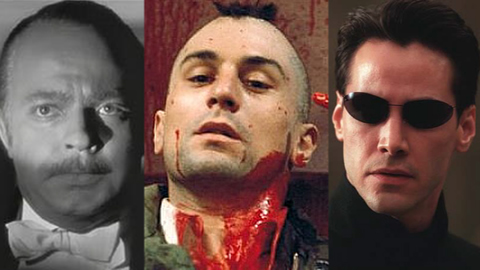Top 10 Years in Film History

Every now and then Hollywood manages a sudden streak of excellence. In this video, http://www.WatchMojo.com counts down our picks for the top 10 years in film history. For this list, we're focusing on those years when it was a great time to be a movie-goer; when Hollywood released not just one but a string of excellent, critically acclaimed and beloved movies that remain influential well past their years of release.
Special thanks to our users jwiking62, dlb42, kyle_hodge, Simon Dreesch-Ro, popdude, Rotten Tardises, clrkey123 and Felipe Herrera for submitting the idea on our Suggestions Page at WatchMojo.comsuggest
#10: 1976
Though Sylvester Stallone’s star turn as “The Italian Stallion” Rocky Balboa took home the Best Picture Oscar, it did so in one of the most competitive years in the category’s history. Boundary-pushing films Like Martin Scorsese’s “Taxi Driver” and Sidney Lumet’s “Network” helped round out the year, which was the pinnacle of a decade when Hollywood’s studio system was brought to its knees and back again by bigger and bolder filmmaking.
#9: 1967
Laying the groundwork for the coming decade of change was 1967: a year in which films like Mike Nichols’ “The Graduate,” Arthur Penn’s “Bonnie and Clyde,” and Stanley Kramer’s “Guess Who’s Coming to Dinner” would explore sexuality, violence, and race in ways only hinted at by their predecessors. But perhaps none examined racial tensions as much as that year’s Best Picture, Norman Jewison’s “In the Heat of the Night.”
#8: 1985
While it was Sydney Pollack’s “Out of Africa” that took home the Best Picture Oscar that year, 1985 was perhaps the coolest year in history to be a teenager – at least according to the movies. For example, we went back to the ‘50s with Marty McFly in Robert Zemeckis’ “Back to the Future,” discovered pirate’s treasure in suburbia in Richard Donner’s “The Goonies,” and navigated a social landscape – which was terrifying in its own right – with in John Hughes’ “The Breakfast Club.”
#7: 1941
With John Ford’s “How Green Was My valley” winning Best Picture and Howard Hawks’ “Sergeant York” coming in as the year’s highest grosser, 1941 was a banner year. It not only produced arguably the greatest film noir ever in John Huston’s “The Maltese Falcon,” but also what many have labeled the greatest film ever – period: Orson Welles’ “Citizen Kane.” While these two will forever be a part of movie history, it was also a notable year during Disney’s golden age thanks to the dark, but highly successful “Dumbo.”
#6: 1962
War, racial inequity, sexual assault and, well, more war: ‘62 was a serious year. Led by Peter O’Toole’s depiction of T.E. Lawrence, the Best Picture-winning “Lawrence of Arabia” was a sprawling epic on a scale of few films before or since. The adaptation of one of the greatest American novels ever “To Kill a Mockingbird,” and one of the most realistic depictions of D-Day in “The Longest Day,” make 1962 an important year for film, while the debut James Bond film, “Dr. No” launched Sean Connery to fame.
#5: 1982
Though it was Richard Attenborough’s “Gandhi that nabbed Best Picture, 1982 was arguably the greatest year in science fiction film history: “E.T.,” “Blade Runner,” “The Thing,” “Tron” and “Star Trek II: The Wrath of Khan” take the genre to astonishing new heights. While “E.T.” was the clear critical and box-office champion, the impact of each of these films resonates decades later. Oh yeah, and Dustin Hoffman donned a dress for some crowd-pleasing cross-dressing shenanigans in Sydney Pollack’s “Tootsie.”
#4: 1999
Not every film year can boast an iconic drama, action and cult classic. While the stunning “American Beauty” was the clear choice for Best Picture, “The Matrix” and “Fight Club” – at first glance simple action movies – challenged audiences to question the existential, societal, and even physical world around them. This is equally true of Shyamalan’s haunting, twisty, and quotable film “The Sixth Sense.” But 1999’s highest grossing film? The first “Star Wars” installment in over 15 years: “The Phantom Menace.”
#3: 1977
Let’s face it: without 1977 there would be no 1982 – film-wise anyway. ’77 featured a classic of the old school of science fiction with Steven Spielberg’s “Close Encounters of the Third Kind,” as well as the one that redefined the genre, George Lucas’ “Star Wars.” And, while John Travolta danced his way into Hollywood history in “Saturday Night Fever,” Woody Allen was winning Best Picture by working outside the studio system to bring us his New York rom-com “Annie Hall.”
#2: 1939
Probably the most decorated year in cinematic history, and that which is most indicative of Hollywood’s Golden Era, 1939 produced two of the most sprawling and glamorous achievements in cinema history, in “The Wizard of Oz,” and David O. Selznick’s Best Picture-winning “Gone with the Wind.” Not only that, the year also cemented the relationship between John Wayne and John Ford, and taught generations what a filibuster is.
Before we unveil our number one pick, here are a few honorable mentions:
- 1957
- 1940
- 1969
- 2007
- 1960
#1: 1994
While 1939 may have redefined the epic Hollywood film, no year has had a bigger impact on the films of today than 1994. While Robert Zemeckis’ “Forrest Gump” dominated the Oscars, Jim Carrey was forging his career and Disney succeeded with “The Lion King,” little-known filmmaker Quentin Tarantino’s non-sequential, violent masterpiece also has a lasting impact. And, who can forget the incredible Morgan Freeman-narrated jailbreak masterpiece “The Shawshank Redemption” and Kevin Smith’s “Clerks” – which signaled a new era of influence for independent filmmakers.
Do you agree with our list? What year got you visiting the cinema on a weekly basis? Make sure to subscribe to WatchMojo.com for more top 10s, published daily!


 0
0
 1
1
 report
report

 0
0
 0
0
 report
report

 0
0
 0
0
 report
report
 0
0
 0
0
 report
report

 0
0
 0
0
 flagged
flagged